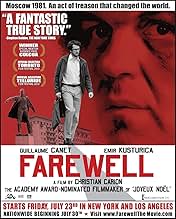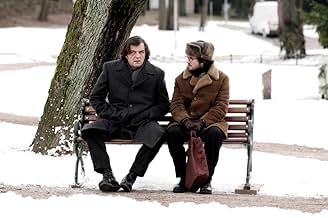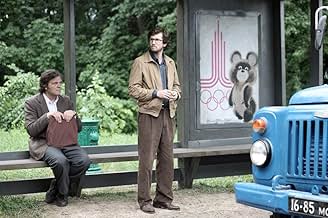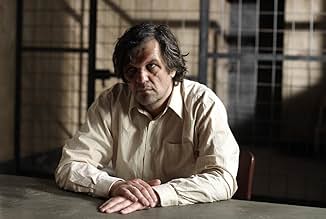IMDb RATING
6.9/10
7.1K
YOUR RATING
The French intelligence service alerts the U.S. about a Soviet spy operation during the height of the Cold War, which sets off an unfortunate chain of events.The French intelligence service alerts the U.S. about a Soviet spy operation during the height of the Cold War, which sets off an unfortunate chain of events.The French intelligence service alerts the U.S. about a Soviet spy operation during the height of the Cold War, which sets off an unfortunate chain of events.
- Director
- Writers
- Stars
Aleksey Gorbunov
- Choukhov
- (as Oleksii Gorbunov)
Evgeniy Kharlanov
- Igor
- (as Yevgeni Kharlanov)
Timothé Riquet
- Damien
- (as Timothe Riquet)
Vsevolod Shilovskiy
- Gorbachev
- (as Vsevolod Shilovsky)
Vladimir Tolstoy
- Chef du KGB
- (as Vladimir Tolsty)
- Director
- Writers
- All cast & crew
- Production, box office & more at IMDbPro
Featured reviews
Farewell is a spy drama set in Moscow/Russia in the early 1980's. It stars Guillaume Canet and Emir Custarica, both noted directors in their own rights.It is based on real events with the basic story correct though the nature of the two leading characters and a few events are somewhat changed or omitted.
The plot centres around the leaking of Russian intelligence to the French government. Sergei (Canet) works for the Russian secret service but has been recruited by (or volunteered to) the French government to pass intelligence data from his office. Sergei is doing this for purely moral reasons arguing that it will one day bring the system down and give his son a better future. His contact is a French engineer working in Moscow, Pierre, coerced in to helping by the French government and operating as Sergei's dropping point. The story develops around the personal relationship between Sergei and Pierre and also that of their families. Sergei is confident and casual but ultimately a little careless. While Pierre becomes paranoid and with his young family in tow begins to feel the stress.
The data turns out to industrial espionage on everything from the Space Shuttle to the US defence strategy and even secret communication codes. When the American are shown the information by the French (in a neat piece of one-upmanship) it is only a matter of time before action has to be taken and lives are in danger.
The pace is slow and constant and never flat. Tantalisingly delicate, a very light brush from the director allows the actors to communicate in manner rarely seen in Hollywood films. Similar with the cinematography which is used sparingly and always to accentuate the story. Watch out for the early scene where they first meet which simply says 'spies'. Then the scenes of northern Russia in winter.
This is a very smart film with excellent understated performances from all the cast. Watch out for several more famous actors in cameo and small roles. Fred Ward playing Ronald Reagan looks positively weird though they get away with it.
If you arrived here before viewing be sure, it is well worth watching. Spy Game plus.
The plot centres around the leaking of Russian intelligence to the French government. Sergei (Canet) works for the Russian secret service but has been recruited by (or volunteered to) the French government to pass intelligence data from his office. Sergei is doing this for purely moral reasons arguing that it will one day bring the system down and give his son a better future. His contact is a French engineer working in Moscow, Pierre, coerced in to helping by the French government and operating as Sergei's dropping point. The story develops around the personal relationship between Sergei and Pierre and also that of their families. Sergei is confident and casual but ultimately a little careless. While Pierre becomes paranoid and with his young family in tow begins to feel the stress.
The data turns out to industrial espionage on everything from the Space Shuttle to the US defence strategy and even secret communication codes. When the American are shown the information by the French (in a neat piece of one-upmanship) it is only a matter of time before action has to be taken and lives are in danger.
The pace is slow and constant and never flat. Tantalisingly delicate, a very light brush from the director allows the actors to communicate in manner rarely seen in Hollywood films. Similar with the cinematography which is used sparingly and always to accentuate the story. Watch out for the early scene where they first meet which simply says 'spies'. Then the scenes of northern Russia in winter.
This is a very smart film with excellent understated performances from all the cast. Watch out for several more famous actors in cameo and small roles. Fred Ward playing Ronald Reagan looks positively weird though they get away with it.
If you arrived here before viewing be sure, it is well worth watching. Spy Game plus.
Serguei Kostine's book 'Bonjour Farewell' serves as the source of the historical moments of one of the most important fractures in the Cold War in 1981 - the act of valor of Sergei Gregoriev - and the script for this very important and controversial film was written by Eric Reynaud and Christian Carion who also directed this stunning film (he is best remembered for his brilliant 'Joyeux Noël' which incidentally starred many of the actors in this film). It is a disturbing movie to watch, a film that was condemned by the Russian government, disallowing filming in Moscow - except for some undercover camera work for an apparent Coca-Cola commercial, and refusing to allow Russian actors to take part in the project. It reveals the brutality of the Communist regime of the time, a period Russia would prefer to remain occult
The story is somewhat convoluted, a fact that makes it even more revealing of the nature of espionage work at the time. Sergei Gregoriev (Emir Kusturica) passes secret documents to French spy Pierre Froment (Guillaume Canet) living in Moscow with his wife (Alexandra Maria Lara), documents so important that Froment must take extraordinary risks to pass them to the US Government. In the US President Reagan (Fred Ward) must balance the importance of these documents with the balance of relationships with the French government under François Mitterrand (Philippe Magnan) it is a tense struggle for power and at the crux of it is Froment and the ultimately captured Gregoriev who is tortured to reveal his French espionage contact. The rush to finish at the end of the film is breathtaking and heartbreaking. There is a conversation between Froment and the US Feeney (Willem Dafoe) that places the soul of the Cold War years in perspective.
Every aspect of this film is involving - the acting is first rate from everyone involved, the pacing is in the fashion edge of the seat direction, and the sharing of the innermost secrets of espionage is information we all should study. A reenactment of the Reagan/Gorbachev era as well defined as any film has dared to show us. Not only is this excellent filmmaking, but it is also information about a man's (Sergei Gregoriev) sacrifice that deserve honor.
Grady Harp
The story is somewhat convoluted, a fact that makes it even more revealing of the nature of espionage work at the time. Sergei Gregoriev (Emir Kusturica) passes secret documents to French spy Pierre Froment (Guillaume Canet) living in Moscow with his wife (Alexandra Maria Lara), documents so important that Froment must take extraordinary risks to pass them to the US Government. In the US President Reagan (Fred Ward) must balance the importance of these documents with the balance of relationships with the French government under François Mitterrand (Philippe Magnan) it is a tense struggle for power and at the crux of it is Froment and the ultimately captured Gregoriev who is tortured to reveal his French espionage contact. The rush to finish at the end of the film is breathtaking and heartbreaking. There is a conversation between Froment and the US Feeney (Willem Dafoe) that places the soul of the Cold War years in perspective.
Every aspect of this film is involving - the acting is first rate from everyone involved, the pacing is in the fashion edge of the seat direction, and the sharing of the innermost secrets of espionage is information we all should study. A reenactment of the Reagan/Gorbachev era as well defined as any film has dared to show us. Not only is this excellent filmmaking, but it is also information about a man's (Sergei Gregoriev) sacrifice that deserve honor.
Grady Harp
Farewell is the wrought piece of espionage spy fiction you didn't really expect to be as good as it is; as is often the case, films and film-makers take it upon themselves to entrust that elements of espionage and distrust between superpowers, or people therein epitomising superpowers, should make for crash-bang, explosive viewing involving very little narrative; very little character and a whole lot of wooden spectacle. It is with open arms then, that we welcome in Christian Carion's 2011 film Farewell; the anti-thesis to Mission Impossible: II or a badly drawn Bond film of the post-Dalton era. The film is one of its ilk that happens to have both a soul and a brain; these characters are people involved in international espionage and some rather dangerous stuff, but they are people involved in such things whilst doing their utmost to maintain families; they are people involved in what they're in, of whom enjoy playing tennis and reading poetry and listening to Queen – they are human beings; they can be overweight; they can wear glasses; they can relax by watching a Western, they are not stock action heroes of a ridiculously photogenic nature; they are not James Bonds darting around in sports cars out-peddling a space orientated laser beam.
The scene epitomising how Farewell really is different to most others of its ilk arrives with a snappy sequence set on a park bench between two people; as might be considered standard with any film of this ilk, we witness such a sequence that is often the first thing people think of when certain genre buzz words are mentioned. Here, the already seated man witnesses another slump down next to him so that they may continue their business – business which would result in serious ramifications should either of them be caught. Instead of cutting to the chase and prolonging causality, the new arrival first mutters about how he hates the fact he is having an affair with someone away from his marriage; that his son knows all about it and, he feels, hates him as a result. Such is the film's nature to take something familiar to the genre, or something with which we will identify, and spin it around to encompass character; to encompass problems away from what would usually be the sole and lone body of content; to take an instance as stereotypical as two blokes meeting on a park bench and incorporate some sort of air of both naturality and substance to proceedings.
The sense that we're being treated like adults begins with the opening sequence, a procession of found footage depicting numerous things Cold-war orientated ranging from shots taken from the fronts of the Vietnam War to numerous technological advancements of the 1970s alluding to the Space Race. All of it is Cold-War orientated and it arrives without voice-overs informing us of what's what and why we're seeing what we're seeing; there is no brief expositional history lesson. Guillaume Canet pays Pierre Froment, an engineer living in Russia with his family of wife and young daughter; the man observes a television set displaying a McEnroe-Borg tennis match, this sense of there being a fondness for that of duelling; a fondness of keeping up with how two super-powers in a respective field are getting along in their long, intense rivalry prominent.
The film is a double-stranded piece, a piece flicking between two men occupying Moscow in the early 1980s doing their utmost to transfer information from secretive sources onto the Americans, and that of the American president of the time in Ronald Reagan (Ward), no less, who dishes it out to his international colleagues, particularly that of then-French Socialist President François Mitterrand (Magnan), when he isn't confining with his own. Pierre's friend is Emir Kusturica's large, life-weary Soviet native to their surroundings Sergei Gregoriev; a man with his own wife and son with whom he does not get along. Sergei uses Pierre as a half-way house in his delivering of top-secret Soviet intelligence which eventually make their way through to the upper-echelons of The White House, a premise spun out by director Carion to really good effect as we delve into this world of lies and power-play.
In spite of the two strands and the array of characters, ranging from this lowly Frenchman to the President of the United States himself, it is Pierre's film; a man caught up in this mucky pool of grime and maltrust and having it go on to affect his home life and general well-being. In a subway fairly early on, it is established how efficient and how clinical the police state work; their picking up of an unknown woman after the insinuation Pierre is in trouble reiterates what he is up against - the verbal establishment beforehand of Pierre's inexperience within this field follows that of Sergei's infiltrating of the backseat to his car with enough ease to fool Pierre as to his even being there. In this regard, the tension is often palpable; if for the fact we often fear Pierre's capture, something that would not stop the film from carrying on with one of its other equilibriums but as to whether his actions will destroy his exemplary home situation and those he holds dear to him. Farewell is the spy thriller peering in at the private lives of these people; the primary stuff about passing on information and keeping informants secret acting as a mere premise to fascinating accounts of how these people exist with themselves; with their families and with one another, the bulk of it making for really good value – you could sure do worse for a thriller.
The scene epitomising how Farewell really is different to most others of its ilk arrives with a snappy sequence set on a park bench between two people; as might be considered standard with any film of this ilk, we witness such a sequence that is often the first thing people think of when certain genre buzz words are mentioned. Here, the already seated man witnesses another slump down next to him so that they may continue their business – business which would result in serious ramifications should either of them be caught. Instead of cutting to the chase and prolonging causality, the new arrival first mutters about how he hates the fact he is having an affair with someone away from his marriage; that his son knows all about it and, he feels, hates him as a result. Such is the film's nature to take something familiar to the genre, or something with which we will identify, and spin it around to encompass character; to encompass problems away from what would usually be the sole and lone body of content; to take an instance as stereotypical as two blokes meeting on a park bench and incorporate some sort of air of both naturality and substance to proceedings.
The sense that we're being treated like adults begins with the opening sequence, a procession of found footage depicting numerous things Cold-war orientated ranging from shots taken from the fronts of the Vietnam War to numerous technological advancements of the 1970s alluding to the Space Race. All of it is Cold-War orientated and it arrives without voice-overs informing us of what's what and why we're seeing what we're seeing; there is no brief expositional history lesson. Guillaume Canet pays Pierre Froment, an engineer living in Russia with his family of wife and young daughter; the man observes a television set displaying a McEnroe-Borg tennis match, this sense of there being a fondness for that of duelling; a fondness of keeping up with how two super-powers in a respective field are getting along in their long, intense rivalry prominent.
The film is a double-stranded piece, a piece flicking between two men occupying Moscow in the early 1980s doing their utmost to transfer information from secretive sources onto the Americans, and that of the American president of the time in Ronald Reagan (Ward), no less, who dishes it out to his international colleagues, particularly that of then-French Socialist President François Mitterrand (Magnan), when he isn't confining with his own. Pierre's friend is Emir Kusturica's large, life-weary Soviet native to their surroundings Sergei Gregoriev; a man with his own wife and son with whom he does not get along. Sergei uses Pierre as a half-way house in his delivering of top-secret Soviet intelligence which eventually make their way through to the upper-echelons of The White House, a premise spun out by director Carion to really good effect as we delve into this world of lies and power-play.
In spite of the two strands and the array of characters, ranging from this lowly Frenchman to the President of the United States himself, it is Pierre's film; a man caught up in this mucky pool of grime and maltrust and having it go on to affect his home life and general well-being. In a subway fairly early on, it is established how efficient and how clinical the police state work; their picking up of an unknown woman after the insinuation Pierre is in trouble reiterates what he is up against - the verbal establishment beforehand of Pierre's inexperience within this field follows that of Sergei's infiltrating of the backseat to his car with enough ease to fool Pierre as to his even being there. In this regard, the tension is often palpable; if for the fact we often fear Pierre's capture, something that would not stop the film from carrying on with one of its other equilibriums but as to whether his actions will destroy his exemplary home situation and those he holds dear to him. Farewell is the spy thriller peering in at the private lives of these people; the primary stuff about passing on information and keeping informants secret acting as a mere premise to fascinating accounts of how these people exist with themselves; with their families and with one another, the bulk of it making for really good value – you could sure do worse for a thriller.
I had some previous knowledge of the Farewell-affair, so i came in knowing pretty much what to expect. On the whole they seemed to pull it off pretty well. The one thing that did grate me though were the scenes with Ronald Reagan in them. The acting and dialogue in those are way under par for the movie and seriously impacted my enjoyment of the rest of it.
But yeah. If you want the reverse Snowden then this is the movie for you. The pacing is all right. It is not horribly complicated, as far as spy thrillers go.
A tense dropoff here, an escape here, some exposition of character motivation, some family drama, a whiff of secrecy and an outcome which is never in doubt.
But yeah. If you want the reverse Snowden then this is the movie for you. The pacing is all right. It is not horribly complicated, as far as spy thrillers go.
A tense dropoff here, an escape here, some exposition of character motivation, some family drama, a whiff of secrecy and an outcome which is never in doubt.
It's 1981 in Moscow. Pierre Froment (Guillaume Canet) is low level French diplomat who meets Soviet colonel Sergei Gregoriev (Emir Kusturica). Sergei is dismissive of the young diplomat at first. He has a rebellious son at home. He wants to change the world, change the USSR, and sees himself as a patriot. He has an affair with a colleague. Mitterrand keeps the information closely guarded using the information as currency with American president Reagan. Sergei is given the code name 'Farewell'.
Based on a book, this has the sound of truth and that's what so compelling. It's not a Bond movie or even a gritty convoluted spy thriller. The meetings are so mundane and so easy. It's not a movie high in tension except for the ending. This is a spy movie with the feel of the real world. It's about a flawed human being but he's never inhuman. There are many changes to the real story. All I know is that it has a sense of the real world.
Based on a book, this has the sound of truth and that's what so compelling. It's not a Bond movie or even a gritty convoluted spy thriller. The meetings are so mundane and so easy. It's not a movie high in tension except for the ending. This is a spy movie with the feel of the real world. It's about a flawed human being but he's never inhuman. There are many changes to the real story. All I know is that it has a sense of the real world.
Did you know
- TriviaAlexander Avdeev (Russian ambassador in France who became Russian Culture Minister and who had been expelled from France in 1983 because of Farewell) blocked most Russian actors to play in this movie, including Sergey Makovetskiy and Nikita Mikhalkov, because he did not want to back a movie about a Russian traitor. He also blocked authorizations to film in Moscow, while most of the plot takes place in Moscow. Christian Carion had to pretend to film a Coca Cola advertisement for the few images of the city.
- GoofsIn the Soviet Union, motorists would typically keep their windscreen wipers in their glove compartments for fear of having them stolen, as they were hard to come by. Yet in the movie, every single car has its wipers attached.
- ConnectionsFeatured in En bonne intelligence (2010)
- How long is Farewell?Powered by Alexa
Details
- Release date
- Country of origin
- Official sites
- Languages
- Also known as
- The Farewell Affair
- Filming locations
- Production companies
- See more company credits at IMDbPro
Box office
- Budget
- €17,500,000 (estimated)
- Gross worldwide
- $7,406,706
- Runtime1 hour 53 minutes
- Color
- Sound mix
- Aspect ratio
- 1.85 : 1
Contribute to this page
Suggest an edit or add missing content




































